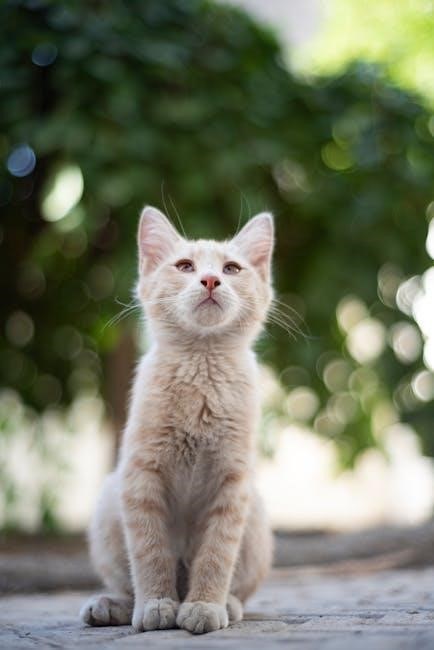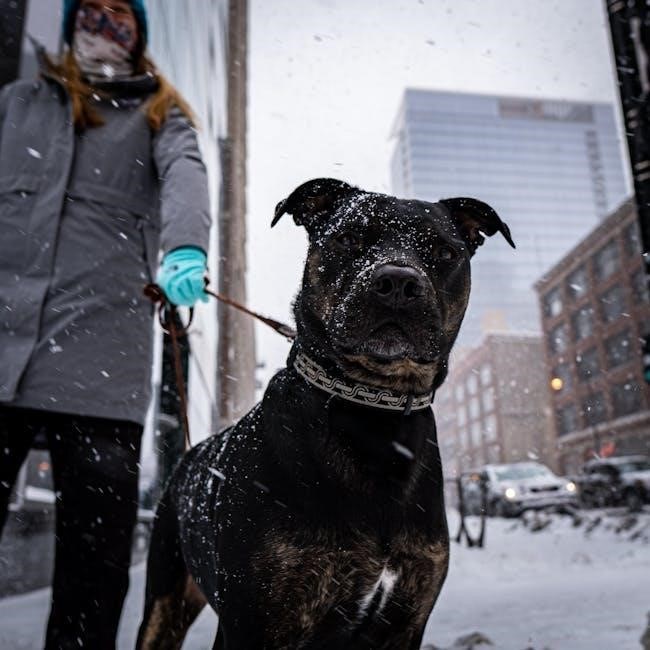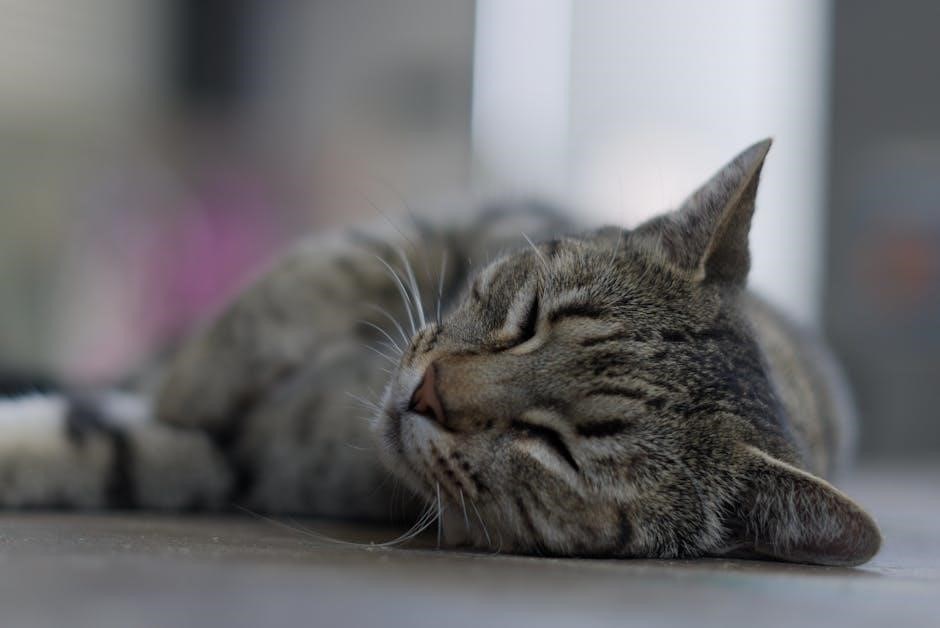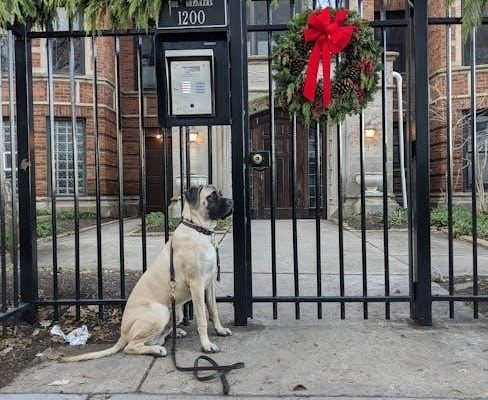Understanding the legal pets in Illinois is crucial for responsible pet ownership, ensuring safety, and complying with state regulations․ Illinois law governs various animals, from common household pets to exotic species, requiring specific permits and licenses․ This guide provides an overview of legal pets, prohibited species, and special considerations, helping residents make informed decisions about pet ownership while adhering to local and state laws․
Importance of Knowing Legal Pets in Illinois
Knowing the legal pets in Illinois is essential for responsible ownership, public safety, and compliance with state laws․ Illinois regulates pets to prevent zoonotic infections, ensure animal welfare, and maintain ecological balance․ Certain exotic pets require permits, while others are outright banned to protect native wildlife․ Understanding these regulations helps avoid legal penalties, such as fines or confiscation of illegal pets․ Additionally, landlords often restrict pet breeds, making awareness crucial for tenants․ Familiarity with Illinois pet laws also aids in ensuring the health and safety of both humans and animals, fostering a harmonious coexistence within communities․
Overview of Illinois Pet Laws and Regulations
Illinois pet laws are designed to ensure public safety, animal welfare, and environmental protection․ The state regulates pets through agencies like the Illinois Department of Agriculture and local authorities․ Key legislation includes the Illinois Animal Control Act and the Humane Care for Animals Act, which outline standards for pet ownership․ Certain exotic pets require special permits, while others are prohibited to prevent ecological harm․ Landlords may restrict pets, and assistance animals are protected under specific laws․ Compliance with these regulations is essential to avoid penalties and ensure harmonious coexistence between humans and animals in Illinois․

Overview of Illinois Pet Laws
Illinois pet laws are enforced by agencies like the Department of Agriculture and local authorities, focusing on public safety, animal welfare, and environmental protection through clear regulations․
Regulatory Agencies and Authorities
In Illinois, pet laws are enforced by various regulatory agencies, ensuring compliance with state and local regulations․ The Illinois Department of Agriculture oversees pet breeding, sales, and exotic species, requiring permits for certain animals․ Local animal control agencies enforce ordinances related to public safety and animal welfare․ The Illinois Department of Natural Resources (IDNR) regulates wildlife and exotic pets, while the Illinois Department of Public Health (IDPH) addresses zoonotic diseases and rabies control․ These agencies work together to protect both humans and animals, ensuring a balanced approach to pet ownership and wildlife management within the state․
Key Legislation Governing Pet Ownership
Illinois pet ownership is governed by specific laws ensuring animal welfare and public safety․ The Illinois Animal Control Act regulates rabies vaccinations, licensing, and stray animal management․ The Humane Care for Animals Act sets standards for animal treatment, prohibiting cruelty and neglect․ Exotic pets are subject to the Illinois Exotic Pets Act, requiring permits for certain species․ Additionally, local ordinances may impose breed restrictions or require special permits․ These laws aim to balance pet ownership rights with community safety, ensuring responsible care and minimizing risks associated with exotic and domestic animals․ Compliance with these regulations is essential for legal pet ownership in Illinois․
Common Household Pets in Illinois
Common household pets in Illinois include dogs, cats, birds, fish, and small mammals like hamsters and rabbits․ These animals are widely accepted and regulated under state laws․
Dogs and Cats
Dogs and cats are the most common household pets in Illinois, with specific regulations ensuring their welfare and public safety․ Rabies vaccinations are mandatory for both, and owners must maintain updated records․ Licensing requirements vary by county but typically apply to dogs, while cats are generally exempt․ Breed restrictions may apply in certain municipalities, particularly for dogs deemed aggressive․ Landlords often require permission for pets, and service animals are protected under state and federal laws․ Spaying or neutering is encouraged but not universally mandated․ Illinois law also addresses animal cruelty, ensuring humane treatment of dogs and cats․ These regulations help maintain a balance between pet ownership rights and community well-being․
Birds, Fish, and Small Mammals
Birds, fish, and small mammals are popular pets in Illinois, with minimal regulatory oversight․ Common species like parakeets, cockatiels, and canaries are widely accepted, while fish such as goldfish and tropical varieties are legal without permits․ Small mammals, including hamsters, gerbils, guinea pigs, and rabbits, are also permitted and often kept as family pets․ Their care is generally straightforward, and they do not require special licenses․ These animals are ideal for households seeking low-maintenance companionship․ However, owners should ensure proper housing and care to maintain the health and well-being of these pets․ Local ordinances may apply, so it’s wise to check specific regulations before bringing these animals home․
Reptiles and Amphibians
Reptiles and amphibians are popular exotic pets in Illinois, with specific regulations governing their ownership․ Common legal species include turtles, geckos, and non-venomous snakes, which are widely permitted․ Amphibians like frogs are also allowed, provided they are not endangered or protected․ However, certain venomous snakes and native wildlife are prohibited to ensure public safety and environmental balance․ Owners must obtain necessary permits for specific species and ensure proper care to prevent harm to both humans and animals․ Illinois law encourages responsible ownership of these unique pets while protecting biodiversity and public health through clear guidelines and restrictions on certain species․

Exotic Pets in Illinois
Illinois permits certain exotic pets, such as non-venomous snakes, turtles, and ferrets, while prohibiting others like wolves and primates․ Ownership requires proper permits and adherence to state regulations ensuring public safety and environmental balance;
Allowed Exotic Pets
In Illinois, certain exotic pets are permitted with proper permits and licenses․ Non-venomous snakes, such as ball pythons and corn snakes, are allowed․ Turtles, ferrets, and select birds, like racing pigeons, are also legal․ Small mammals, including domesticated rabbits and hamsters, are permitted․ Additionally, arctic foxes can be kept as pets if obtained from a USDA-licensed breeder with a fur-bearing mammal breeder permit․ Exotic animals not classified as dangerous or invasive are generally allowed, provided they meet state and local regulations․ Service animals, regardless of species, are exempt from standard pet restrictions under Illinois law․ Always verify specific requirements before acquiring an exotic pet․

Prohibited Exotic Pets
In Illinois, certain exotic pets are prohibited to protect public safety and native ecosystems․ Big cats, such as lions and tigers, are banned, along with bears, wolves, and venomous snakes like cobras and vipers․ Alligators, crocodiles, and caimans are also prohibited due to their potential threat․ Additionally, exotic animals classified as invasive or dangerous under state law are restricted․ For example, wolf-dog hybrids are prohibited unless they are fifth-generation and meet specific requirements․ Permits for prohibited exotic pets are rarely issued, and violations can result in fines and confiscation of the animal․ Always verify state and local regulations before considering exotic pets in Illinois․
Special Considerations for Pet Ownership

Special considerations include rules for assistance and service animals, which are protected under housing laws, and specific regulations for owning farm animals in Illinois․
Assistance Animals and Service Animals
Assistance animals, including service animals, are protected under Illinois law, with specific provisions ensuring their accommodation in housing and public spaces․ These animals are not considered pets but are essential for individuals with disabilities․ The Fair Housing Act and Americans with Disabilities Act (ADA) provide legal protections, allowing assistance animals even in areas with pet restrictions․ Landlords must make reasonable accommodations, though documentation from a healthcare provider may be required․ Service animals, trained to perform specific tasks, are exempt from breed or size restrictions․ Illinois law emphasizes the importance of balancing animal ownership rights with public safety and health considerations, ensuring equal access for all․
Farm Animals and Livestock
Farm animals and livestock in Illinois are regulated based on their classification and use․ Common farm animals such as cows, pigs, chickens, and horses are generally permitted, provided they are kept in accordance with local zoning laws and health regulations․ Livestock intended for agricultural purposes are subject to specific licensing and permitting requirements․ Illinois state laws differentiate between farm animals and domestic pets, with separate guidelines for their care and management․ Additionally, local ordinances may impose restrictions on the number and types of farm animals allowed in certain areas, particularly in urban or suburban regions, to maintain community standards and public safety․ Proper registration and adherence to health standards are essential․

Illegal Pets in Illinois

Illegal pets in Illinois include certain exotic animals like big cats and bears․ Wildlife and endangered species are strictly prohibited as pets․ Some exotic animals require special permits; others are banned outright․ Penalties for keeping illegal pets can be severe, including fines and legal action․
Wildlife and Endangered Species
Wildlife and endangered species are strictly prohibited as pets in Illinois to protect public safety and conserve biodiversity․ Animals like big cats, bears, wolves, and certain reptiles fall under this category․ The Illinois Department of Agriculture and the Illinois Endangered Species Protection Act regulate these restrictions․ Keeping such animals without proper permits is illegal and can result in severe penalties․ Exotic pets like arctic foxes may be allowed with specific permits, but most wildlife is off-limits for private ownership․ This ensures the welfare of both humans and animals, maintaining ecological balance and preventing potential threats to native ecosystems․
Exotic Animals Requiring Special Permits
Certain exotic animals in Illinois require special permits to ensure public safety, animal welfare, and environmental protection․ These include specific reptiles, amphibians, and mammals not classified as household pets․ For example, arctic foxes can be kept with a fur-bearing mammal breeder permit, while some snakes and turtles may need permits if they are non-native or fall under specific regulations․ The Illinois Department of Agriculture oversees these permits, ensuring exotic pets are obtained legally and humanely․ Permits are often required to prevent ecological disruption and protect native wildlife․ Owners must meet strict criteria, such as obtaining animals from licensed breeders, to receive approval․
Local Ordinances and Variations
Local ordinances in Illinois vary by city or county, with some areas enforcing stricter rules on pet ownership․ Cities like Chicago and Aurora may have additional restrictions or penalties for non-compliance, ensuring community safety and adherence to regional regulations․

City and County-Specific Regulations
In Illinois, pet ownership rules vary significantly across cities and counties․ For instance, Chicago has specific ordinances regarding dog breeds and exotic pets, requiring special permits for certain animals․ Similarly, Aurora and Rockford enforce limits on the number of pets per household․ County regulations may also dictate licensing requirements and noise restrictions․ These local laws aim to balance public safety with pet ownership rights․ Violations can result in fines or legal action, emphasizing the importance of understanding area-specific rules before bringing a pet home․ Additionally, some cities have stricter rules on service animals, requiring proper documentation․ These variations highlight the need for local compliance․
Penalties for Keeping Illegal Pets
In Illinois, keeping illegal pets can lead to severe penalties, including fines and potential criminal charges․ Authorities enforce strict laws against prohibited exotic and wild animals, aiming to protect public safety and ecosystems․ Violators face fines ranging from $500 to $10,000, depending on the offense severity․ Additionally, illegal pets may be confiscated, and owners could be required to pay for relocation or care costs․ Repeat offenses may result in higher penalties or even jail time․ These measures underscore the importance of adhering to state and local regulations to avoid legal consequences and ensure community welfare․ Compliance is essential for responsible pet ownership in Illinois․
